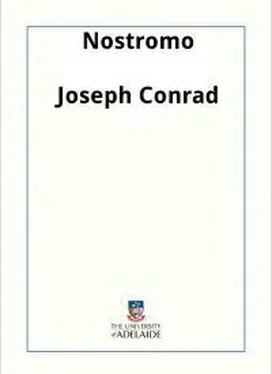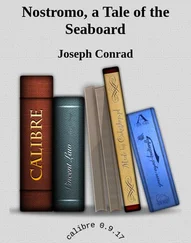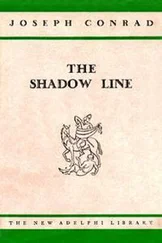Джозеф Конрад - Nostromo - A Tale of the Seaboard
Здесь есть возможность читать онлайн «Джозеф Конрад - Nostromo - A Tale of the Seaboard» весь текст электронной книги совершенно бесплатно (целиком полную версию без сокращений). В некоторых случаях можно слушать аудио, скачать через торрент в формате fb2 и присутствует краткое содержание. Год выпуска: 2006, Жанр: Классическая проза, на английском языке. Описание произведения, (предисловие) а так же отзывы посетителей доступны на портале библиотеки ЛибКат.
- Название:Nostromo: A Tale of the Seaboard
- Автор:
- Жанр:
- Год:2006
- ISBN:нет данных
- Рейтинг книги:4 / 5. Голосов: 1
-
Избранное:Добавить в избранное
- Отзывы:
-
Ваша оценка:
- 80
- 1
- 2
- 3
- 4
- 5
Nostromo: A Tale of the Seaboard: краткое содержание, описание и аннотация
Предлагаем к чтению аннотацию, описание, краткое содержание или предисловие (зависит от того, что написал сам автор книги «Nostromo: A Tale of the Seaboard»). Если вы не нашли необходимую информацию о книге — напишите в комментариях, мы постараемся отыскать её.
Nostromo: A Tale of the Seaboard — читать онлайн бесплатно полную книгу (весь текст) целиком
Ниже представлен текст книги, разбитый по страницам. Система сохранения места последней прочитанной страницы, позволяет с удобством читать онлайн бесплатно книгу «Nostromo: A Tale of the Seaboard», без необходимости каждый раз заново искать на чём Вы остановились. Поставьте закладку, и сможете в любой момент перейти на страницу, на которой закончили чтение.
Интервал:
Закладка:
Since his arrival in Sulaco the colonel’s ideas had undergone some modification.
He no longer wished for a political career in Montero’s administration. He had always doubted the safety of that course. Since he had learned from the chief engineer that at daylight most likely he would be confronted by Pedro Montero his misgivings on that point had considerably increased. The guerrillero brother of the general—the Pedrito of popular speech—had a reputation of his own. He wasn’t safe to deal with. Sotillo had vaguely planned seizing not only the treasure but the town itself, and then negotiating at leisure. But in the face of facts learned from the chief engineer (who had frankly disclosed to him the whole situation) his audacity, never of a very dashing kind, had been replaced by a most cautious hesitation.
“An army—an army crossed the mountains under Pedrito already,” he had repeated, unable to hide his consternation. “If it had not been that I am given the news by a man of your position I would never have believed it. Astonishing!”
“An armed force,” corrected the engineer, suavely. His aim was attained. It was to keep Sulaco clear of any armed occupation for a few hours longer, to let those whom fear impelled leave the town. In the general dismay there were families hopeful enough to fly upon the road towards Los Hatos, which was left open by the withdrawal of the armed rabble under Senores Fuentes and Gamacho, to Rincon, with their enthusiastic welcome for Pedro Montero. It was a hasty and risky exodus, and it was said that Hernandez, occupying with his band the woods about Los Hatos, was receiving the fugitives. That a good many people he knew were contemplating such a flight had been well known to the chief engineer.
Father Corbelan’s efforts in the cause of that most pious robber had not been altogether fruitless. The political chief of Sulaco had yielded at the last moment to the urgent entreaties of the priest, had signed a provisional nomination appointing Hernandez a general, and calling upon him officially in this new capacity to preserve order in the town. The fact is that the political chief, seeing the situation desperate, did not care what he signed. It was the last official document he signed before he left the palace of the Intendencia for the refuge of the O.S.N. Company’s office. But even had he meant his act to be effective it was already too late. The riot which he feared and expected broke out in less than an hour after Father Corbelan had left him. Indeed, Father Corbelan, who had appointed a meeting with Nostromo in the Dominican Convent, where he had his residence in one of the cells, never managed to reach the place. From the Intendencia he had gone straight on to the Avellanos’s house to tell his brother-in-law, and though he stayed there no more than half an hour he had found himself cut off from his ascetic abode. Nostromo, after waiting there for some time, watching uneasily the increasing uproar in the street, had made his way to the offices of the Porvenir, and stayed there till daylight, as Decoud had mentioned in the letter to his sister. Thus the Capataz, instead of riding towards the Los Hatos woods as bearer of Hernandez’s nomination, had remained in town to save the life of the President Dictator, to assist in repressing the outbreak of the mob, and at last to sail out with the silver of the mine.
But Father Corbelan, escaping to Hernandez, had the document in his pocket, a piece of official writing turning a bandit into a general in a memorable last official act of the Ribierist party, whose watchwords were honesty, peace, and progress. Probably neither the priest nor the bandit saw the irony of it. Father Corbelan must have found messengers to send into the town, for early on the second day of the disturbances there were rumours of Hernandez being on the road to Los Hatos ready to receive those who would put themselves under his protection. A strange-looking horseman, elderly and audacious, had appeared in the town, riding slowly while his eyes examined the fronts of the houses, as though he had never seen such high buildings before. Before the cathedral he had dismounted, and, kneeling in the middle of the Plaza, his bridle over his arm and his hat lying in front of him on the ground, had bowed his head, crossing himself and beating his breast for some little time. Remounting his horse, with a fearless but not unfriendly look round the little gathering formed about his public devotions, he had asked for the Casa Avellanos. A score of hands were extended in answer, with fingers pointing up the Calle de la Constitucion.
The horseman had gone on with only a glance of casual curiosity upwards to the windows of the Amarilla Club at the corner. His stentorian voice shouted periodically in the empty street, “Which is the Casa Avellanos?” till an answer came from the scared porter, and he disappeared under the gate. The letter he was bringing, written by Father Corbelan with a pencil by the camp-fire of Hernandez, was addressed to Don Jose, of whose critical state the priest was not aware. Antonia read it, and, after consulting Charles Gould, sent it on for the information of the gentlemen garrisoning the Amarilla Club. For herself, her mind was made up; she would rejoin her uncle; she would entrust the last day—the last hours perhaps—of her father’s life to the keeping of the bandit, whose existence was a protest against the irresponsible tyranny of all parties alike, against the moral darkness of the land. The gloom of Los Hatos woods was preferable; a life of hardships in the train of a robber band less debasing. Antonia embraced with all her soul her uncle’s obstinate defiance of misfortune. It was grounded in the belief in the man whom she loved.
In his message the Vicar-General answered upon his head for Hernandez’s fidelity. As to his power, he pointed out that he had remained unsubdued for so many years. In that letter Decoud’s idea of the new Occidental State (whose flourishing and stable condition is a matter of common knowledge now) was for the first time made public and used as an argument. Hernandez, ex-bandit and the last general of Ribierist creation, was confident of being able to hold the tract of country between the woods of Los Hatos and the coast range till that devoted patriot, Don Martin Decoud, could bring General Barrios back to Sulaco for the reconquest of the town.
“Heaven itself wills it. Providence is on our side,” wrote Father Corbelan; there was no time to reflect upon or to controvert his statement; and if the discussion started upon the reading of that letter in the Amarilla Club was violent, it was also shortlived. In the general bewilderment of the collapse some jumped at the idea with joyful astonishment as upon the amazing discovery of a new hope. Others became fascinated by the prospect of immediate personal safety for their women and children. The majority caught at it as a drowning man catches at a straw. Father Corbelan was unexpectedly offering them a refuge from Pedrito Montero with his llaneros allied to Senores Fuentes and Gamacho with their armed rabble.
All the latter part of the afternoon an animated discussion went on in the big rooms of the Amarilla Club. Even those members posted at the windows with rifles and carbines to guard the end of the street in case of an offensive return of the populace shouted their opinions and arguments over their shoulders. As dusk fell Don Juste Lopez, inviting those caballeros who were of his way of thinking to follow him, withdrew into the corredor, where at a little table in the light of two candles he busied himself in composing an address, or rather a solemn declaration to be presented to Pedrito Montero by a deputation of such members of Assembly as had elected to remain in town. His idea was to propitiate him in order to save the form at least of parliamentary institutions. Seated before a blank sheet of paper, a goose-quill pen in his hand and surged upon from all sides, he turned to the right and to the left, repeating with solemn insistence—
Читать дальшеИнтервал:
Закладка:
Похожие книги на «Nostromo: A Tale of the Seaboard»
Представляем Вашему вниманию похожие книги на «Nostromo: A Tale of the Seaboard» списком для выбора. Мы отобрали схожую по названию и смыслу литературу в надежде предоставить читателям больше вариантов отыскать новые, интересные, ещё непрочитанные произведения.
Обсуждение, отзывы о книге «Nostromo: A Tale of the Seaboard» и просто собственные мнения читателей. Оставьте ваши комментарии, напишите, что Вы думаете о произведении, его смысле или главных героях. Укажите что конкретно понравилось, а что нет, и почему Вы так считаете.












